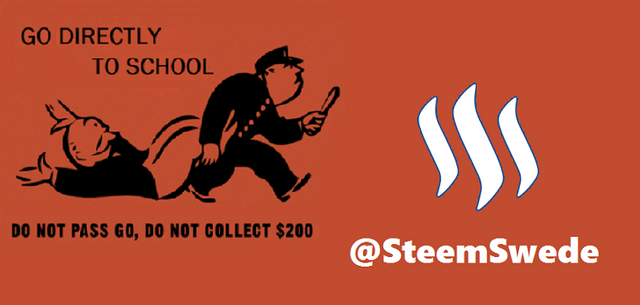[EDUCATION] The 10 worst reasons to go to school

In Sweden, we have compulsory schooling. This basically means that you risk ending up in jail for home-schooling your kids. One of the most common arguments against home-schooling is that kids with poor parents would risk to not receive a basic education. I don't understand why parents would suddenly cease to make sure that their children were educated just because compulsory schooling was abolished - and as if there would be no voluntary alternatives. Central control and monopolies tend not to favor individual development. Do you seriously think it's justifiable that home schooling today is basically illegal, even for parents who can afford it? There is even talk of implementing truancy laws that would send you to jail if your kid skipped enough classes during a year. As I understand it certain states in the US already have such laws.
There are many who are wondering what to do to reduce truancy in school, and some of them are actually sensible enough to first ask WHY students skip class to begin with. For me the best answer, at least at the most basic level, is quite obvious: Students skip class because they don't think the lessons they are skipping are worth their time. Half of the students that are not skipping class are so bored that they are sleeping through the lessons. It's rather absurd that we're not taking our kids seriously and aren't seeing this as a sign that something is very wrong, not with the students, but with the system. Sadly many adults have gotten the idea that students are always in the wrong, and that the problem is best solved by the adult world trying to convince the students that the school system isn't wasting copious amounts of their time. Let's scrutinize some of the worst arguments used for this purpose.

1. "Knowledge has an intrinsic value"
What constitutes a reward or value is inherently subjective, and if someone doesn't experience a an intrinsic reward in knowledge, no one can say there is a reward. If students would have experienced a reward from the textbooks or the classes, they obviously wouldn't have skipped it.
Furthermore, you can learn things while skipping classes. Given that you learn more if you are interested in what you are studying, a student skipping a from his perspecive boring subject (say chemistry) to instead study a from his perspective interesting subject (say cryptocurrency) will learn more by skipping class than by going to school. If "knowledge is its own reward" many class skippers are rewarded the most.
2. "School education provide income later in life"
So why not instead learn skills later in life? Why force a teenager to learn something he or she won't be using until he or she turns 30? Even the knowledge that can be useful soon after completing upper secondary education, primary school is a way too early time. If you asked an adult to work for free 25 hours a week with the promise that it would lead to marginally higher living standards in five or ten years, do you think he or she would go along with it?
Add to this also the fact that knowledge is subject to the whims of the memory. Then you should realize that it not only is unimportant whether one learns something many years in advance or right when you need it, but also unfavorable; unless you happen to be interested in the subject. If you still forget what you learn in school, no matter how important those skills are considered to be - the fact that they are forgotten before leaving school, makes the learning process a waste of time.
3. "You need prior knowledge before higher education"
It's true that there are programs in colleges and universities which require prior knowledge, but it doesn't mean that all programs require the same qualifications. An aspiring electricians do not have the same qualifications as a prospective doctor. An aspiring engineer doesn't need the same qualifications as an aspiring hairdresser, etc.
Given how both universities and colleges are sounding the alarm about how poor the prerequisite skills are in their students, it seems more reasonable to allow students to choose away the subjects they are uninterested in, in order to be able to devote more time to learning of knowledge they actually need.
4. "Few young people know what they want to be when they grow up"
It might be true, but I can promise that every single young student have an idea of what they want to do as an adult. It's of course important that all children have the opportunity to try many different subjects that they may not be familiar with, but if you're 13 years old and have hated every minute of chemistry the last four semesters, there's actually no point in being forced to study chemistry in six semesters more. If a high school student is sure that he or she wants to become an academic - but hasn't chosen a scientific discipline yet - there is absolutely zero gain in having to study craft, technology or domestic science for three years.
5. "General knowledge is important"
Yes, it's important with literacy and general knowledge, but not even close to everything that is taught in school belong to general knowledge. Being able to speak a third language fluently is not general knowledge. Being able to make bird feeders (woodwork), sewing bags (needlework), calculate the size of the rabbit populations (Biology), draw quadratic functions (mathematics), read about the history of rock (music), calculate the refraction angles of light hitting water surfaces (Physics), or draw the molecules by covalent bonds (chemistry) is not general knowledge. School is filled to the brim with compulsory elements that under no reasonable definition can be considered to be general knowledge.
6. "Children must learn discipline and to do as authority figures telling them"
Simply no. That is hardly a fertile ground for learning.

@Steemswede
Schools are obsolete. Sweden is the North Korea of Europe
Really, every reason you quoted is basically just cover bullshit for that last reason. It's important to indoctrinate children into obedience to authority as soon as possible, to reduce the chance that they'll be difficult for authorities in the future.
Don't you think it may be more of a problem the fact that children are tested and graded on these subjects, then the fact that they are made expectators of these classes?
It is true enough for me that A) we might not know we'll like a subject and B) it might be useful to have a rudimentary knowledge of things distant from our fields. If children could get in touch with these subjects, just enough to see if there's a spark, without being expected to memorize and calculate so much of it, don't you think the school could be worth it?
Self development will become more and more important. Schools cannot keep up with the rapid change.
Ironically, when something is a privilege, it has a great value. When something becomes an obligation, we try our best to avoid it... In Russia home-schooling is difficult to organize, but still possible.
We've got pretty strict truancy and attendance laws in Ireland, however, home schooling is allowed.
And to think that Irish people always thought Sweden was a bastion of progressive thinking. Coupled with the Assange debacle I'm beginning to have second thoughts about how great Sweden is.
By the way - it is commonly that a child will learn more in the school yard than in the classroom.
Sweden is so complicated , my former boss has only secondary education but he runs a great company . That's just one , i know minimum 4-5 guys with base education who are running firms with 100-150 employees .
I homeschooled my older son in his later grades, including teaching him high school economics. It's one of the things I'm most proud of!
You should be! Sadly I will not be able to do it with my future kids, if I remain in Sweden that is.
How much time did it take you daily to homeschool your son? What did he do afterwards?
It took all morning, and maybe an hour or two into the afternoon. Once a week we went to a church where I taught an econ class to other homeschooled kids. He's in college now. At first he wanted to study programming, but then switched over to psychology. He's a firm ancap, though.
Gracias por compartir este material, Me gusta lo que has publicado. Muchas Gracias
There are 1,000 ways to get an education. State schools are one way, and the trade-offs are rarely discussed. Every school I attended as a kid was a giant conformity factory. Obedience to arbitrary authority was the #1 lesson at all times.